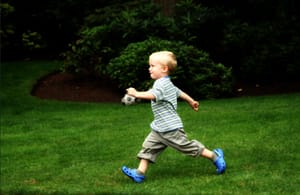How much sleep do I need as I age? You’ve probably heard it a million times before: you need to get enough sleep. And while it may seem like a pointless platitude, there’s actually a lot of truth to it. Getting enough sleep is incredibly important for our overall physical and mental health and wellbeing. For one thing, sleep helps to rejuvenate your body and mind, giving you the energy you need to power through your day. It also plays an important role in helping you to maintain a healthy weight, as well as reducing your risk for heart disease (1) and other chronic health problems.
It helps our bodies recover from the day’s activities. Sleep is essential to allow our brains to process information (2). Without enough sleep, we are more likely to get sick, gain weight, and experience problems with our memory, concentration and decision-making. In short, getting enough sleep is important because it helps us be our best selves.
Babies and Toddlers
We all need different amounts of sleep from the day we are born until the day we die. It’s no secret that babies need plenty of sleep in order to grow and develop properly. But just how much sleep is enough?
Many experts say that new-born babies and young infants should get between fourteen and seventeen hours of sleep each 24-hour day. This tends to be spread throughout the day and night, when babies only wake up to feed. But babies don’t follow what experts say. One thing they seem to be able to do all on their own is sleep….a lot. In fact, they spend more time asleep than awake.
Why do babies sleep so much?
One reason is that babies are growing rapidly and need a lot of energy to support their growth. Sleeping helps them conserve energy and allows their bodies to use that energy for growth.

One of the things that new parents fret about is when their baby will sleep through the night. When babies are born, they need to be fed every few hours, so circadian rhythms do not affect their sleep cycle. This starts to happen when they are approximately three months old (4).
As they grow, babies need a little less sleep than new-borns. Up to a year old, they are likely to sleep for around 14 hours in a 24-hour period (5). The good news is that babies of this age start to sleep for the bulk of that time at night, as the circadian rhythm and body clock kick in. They are likely to take two or three naps during the day as well.
Sleep for Toddlers
A good night’s sleep is important for everyone, but it’s especially crucial for young children. Toddlers need an average of 12 to 14 hours of sleep a day, including naps. That may seem like a lot, but keep in mind that they’re growing at a rapid pace and their brains are developing rapidly. Learning to crawl, walk and explore the world is exhausting, so when toddlers don’t get enough sleep, they can become cranky and irritable.

Second, create a calm and relaxing environment in your child’s bedroom. Make sure the room is dark and quiet, and remove any toys or objects that could distract your child from sleeping. Try to avoid giving your child sugary drinks or foods before bedtime. This can make it harder for them to fall asleep and lead to restless nights caused by indigestion. Finally, as applies to adults, keep televisions and screens out of their bedrooms (6). By following these tips, you can help ensure that your toddler gets the sleep they need.
School children and Teenagers
As toddlers grow and then start school, they need fewer naps during the day, if any (7). By contrast, school-age children need much less sleep, averaging around 9 hours a night. So why the difference? For schoolchildren, their brains are well developed, so they don’t need as much down time. Growth tends to be less constant and they will have growth spurts (8), which tend to happen while they are asleep (9).
Sleep for Teenagers

As with any age group, there is no “one size fits all” answer when it comes to the perfect amount of sleep for teenagers. However, teenagers actually need more sleep than they did around the age of 10. This is because they are going through puberty and they are having a growth spurt that will take them to the height they will be as adults (10). Their bodies are going through a lot of changes. Sex and growth hormones are raging, as the body is growing and developing. On top of that, their brains are maturing and also being stimulated by concentrated learning (11). This can be exhausting, so it’s no wonder they need so much sleep!
Adults
As we all know, getting a good night’s sleep can be a challenge. Between work, family, and social obligations, it can be hard to find time to relax and get some shut-eye. And when you finally do manage to drift off, there’s always the risk of being woken up by a crying baby or a snoring partner. So how much sleep do adults actually need? According to experts, most adults require between 7 and 8 hours of sleep per day.
However, there is some flexibility in this number, and some people may function just fine with 6 hours of sleep, while others may need 9 or 10 hours to feel rested. Ultimately, the amount of sleep that you need is determined by your own body and lifestyle.
Sleep Hygiene

If you have a partner that snores, there are lots of anti-snoring products and devices on the market that he/she can try (13). Alternatively, you can use ear plugs or many people now actually sleep in separate bedrooms. Although that doesn’t sound conducive to a good marriage, it can lead to a much more harmonious relationship with your spouse. And, most importantly of all, a good night’s sleep!
Sleep for The Elderly

As a result, many older adults only get an average of six hours of sleep per night, and that is often broken or disturbed. For this reason, they often tend to nap a lot more during the day. Even a small amount of sleep loss can lead to increases in blood pressure, heart rate (19), and stress hormones (20). This is bad enough when you are young and fit, but our resilience tends to decline as we age and immunity is already compromised due to aging. In addition, sleep loss can impair mental function (21) and increase the risk of falls and accidents (22). As such, it is vital that older adults make sleep a priority and ensure that they are getting enough rest.
In Conclusion
As we go through life, our sleep habits and needs change. Sometimes, it can become more difficult to get a good night’s sleep. Fortunately, there are steps that we can take to improve our sleep hygiene and optimize our sleep patterns. Whether you are a teenager, a young adult, or an older adult, it is important to listen to your body, like babies do, and prioritize adequate rest in order to feel your best.
References
- Sleep plays an important role in heart health https://www.heart.org/en/health-topics/sleep-disorders/sleep-and-heart-health
- Brain Basics: Understanding Sleep https://www.ninds.nih.gov/Disorders/Patient-Caregiver-Education/Understanding-Sleep
- Review of sleep-EEG in preterm and term neonates https://www.ncbi.nlm.nih.gov/pmc/articles/PMC6342258/
- Newborn sleep patterns: A survival guide https://parentingscience.com/newborn-sleep/
- Recommended Amount of Sleep for Pediatric Populations: A Consensus Statement of the American Academy of Sleep Medicine https://www.ncbi.nlm.nih.gov/pmc/articles/PMC4877308/
- Infant Sleep and Parent Health Literacy https://www.ncbi.nlm.nih.gov/pmc/articles/PMC4975997/
- Spotlight on daytime napping during early childhood https://www.ncbi.nlm.nih.gov/pmc/articles/PMC5851571/
- Growth Spurts: What you need to know (ages 5 to 8) https://www.babycenter.com/child/development/growth-spurts-what-you-need-to-know-ages-5-to-8_3658977
- Naps: Babies’ Growth Rate And Sleep Time Related https://www.medicalnewstoday.com/articles/224093#1
- Relationship Between Timing of Peak Height Velocity and Pubertal Staging in Boys and Girls https://www.ncbi.nlm.nih.gov/pmc/articles/PMC4677560/
- Teenagers and Sleep: How Much Sleep Is Enough? https://www.hopkinsmedicine.org/health/wellness-and-prevention/teenagers-and-sleep-how-much-sleep-is-enough
- Sleep Hygiene https://www.wwl.nhs.uk/media/.leaflets/61d8276e8d91a8.96413296.pdf
- TOP10Snoring Aids https://www.top10snoringaids.net/gb
- A Good Night’s Sleep https://www.nia.nih.gov/health/good-nights-sleep
- Better Health While Aging https://betterhealthwhileaging.net/top-5-causes-sleep-problems-in-aging-and-proven-insomnia-treatments/
- Insomnia in the Elderly: A Review https://www.ncbi.nlm.nih.gov/pmc/articles/PMC5991956/
- Spousal loss and health in late life: moving beyond emotional trauma https://www.ncbi.nlm.nih.gov/pmc/articles/PMC3608192/
- 092- Interview: Addressing Nighttime Urination & Insomnia in Aging https://betterhealthwhileaging.net/podcast/bhwa/night-time-urination-and-insomnia-in-aging/
- Short-term sleep deprivation affects heart function https://www.sciencedaily.com/releases/2016/12/161202100943.htm
- Interactions between sleep, stress, and metabolism: From physiological to pathological conditions https://www.ncbi.nlm.nih.gov/pmc/articles/PMC4688585/
- How Lack of Sleep Impacts Cognitive Performance and Focus https://www.sleepfoundation.org/sleep-deprivation/lack-of-sleep-and-cognitive-impairment
- Sleep disturbances and falls in older people https://pubmed.ncbi.nlm.nih.gov/17301039/

